The 1973 dime is a 10-cent coin issued by the US government through its mint centers in 1973. The coin is made of base metals and is over 50 years old. Because of its age, you might want to add a 1973 dime to your collection. If yes, then you need to read through this page to learn more about this coin’s history, design, and value.
What Is the 1973 Roosevelt Dime Made Of?
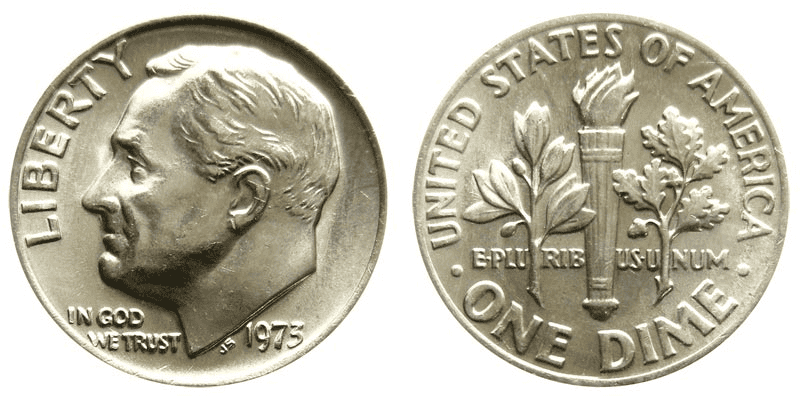
The 1973 Roosevelt dime is made of 75% copper and 25% nickel. This is the composition of the Roosevelt dimes starting in 1965 when the US Mint transitioned the coins from silver to base metals.
The design of the 1973 dime is essentially the same as that of all dimes except for the location of mint marks.
The obverse shows the image of Franklin Roosevelt, the 32nd president of the United States. The inscriptions include the following:
- LIBERTY
- IN GOD WE TRUST
- 1973
- Mint mark (if present)
- Designer’s initials (JS)
On the reverse, you’ll find the following:
- Olive branch – represents peace
- Liberty torch – represents enlightenment
- Oak branch – represents strength
- UNITED STATES OF AMERICA
- E PLURIBUS UNUM – Latin for, “Out of many, one”
- ONE DIME
President Franklin D. Roosevelt, dearly called FDR, died on April 12, 1945. On May 3 of the same year, James Morrison, the Louisiana Representative, introduced a bill allowing the US Mint to produce dimes with the image of Roosevelt. On May 17, the Treasury Secretary, Henry Morgenthau Jr., announced that the Roosevelt dime would replace the Winged Liberty or Mercury dime.
Many people agreed that Roosevelt should be honored by adding him to a US coin. However, not all were happy about it. For example, some people believed at that time that the dime was too small, which would not give honor to the fallen president. Some argue that Roosevelt isn’t as great as Washington, Lincoln, and Jefferson, presidents whose faces are on a US coin, to be equal with them.
Nevertheless, the decision to add Roosevelt to the dime prevailed, and it became one of the longest-issued coin series in the United States.
1973 Roosevelt Dime Varieties
The 1973 Roosevelt dime comes in three varieties. These varieties don’t differ much from each other since all of them use essentially the same designs. The major difference is the mint mark as well as whether they are proof or not.
Here’s a table to show you the different varieties of the 1973 Roosevelt Dime as well as their mintage:
| Variety | Mint Location | Mintage |
| 1973 D Roosevelt Dime | Denver | 455,032,426 |
| 1973 P Roosevelt Dime | Philadelphia | 315,670,000 |
| 1973 S Proof Roosevelt Dime | San Francisco | 2,760,339 |
| Total | 773,462,765 |
The Denver, San Francisco, and Philadelphia mints worked together to produce more than 773 million dimes in 1973.
Here’s a deeper look at each of the Roosevelt dimes:
1973 D Roosevelt Dime
Year of minting: 1973
Mint Mark: D
Place of minting: Denver
Quantity produced: 455,032,426
Face Value: $0.10 (ten cents)
Price: $0.15 to $0.35 (circulated condition)
Mass: 2.27 grams
Edge: Reeded
Designer: John R. Sinnock
Composition: 75% copper, 25% nickel
Diameter: 17.90 millimeters
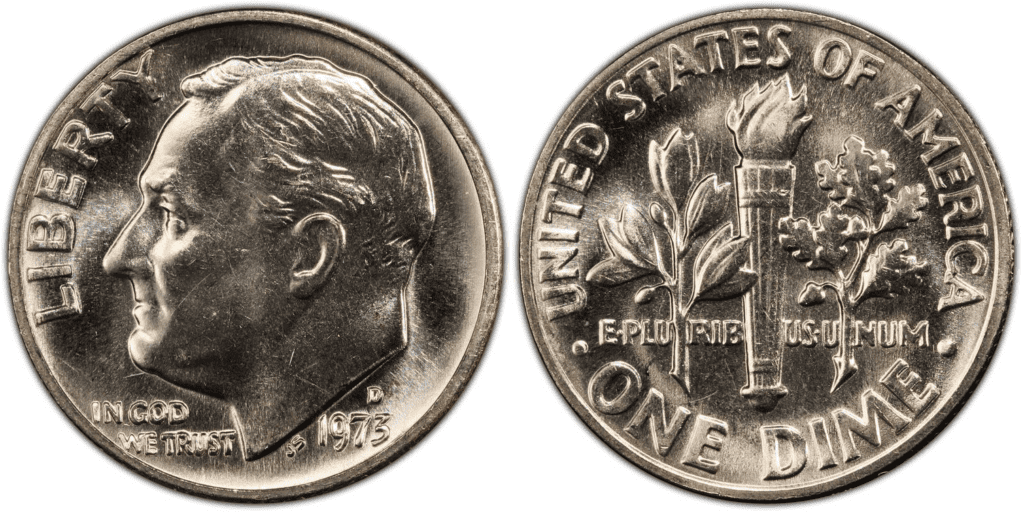
The Denver Mint produced more than 455 million dimes in 1973, which is about the same as what was produced in 1972. However, in 1974, there were more than 571 million dimes produced.
1973 P Roosevelt Dime
Year of minting: 1973
Mint Mark: none
Place of minting: Philadelphia
Quantity produced: 315,670,000
Face Value: $0.10 (ten cents)
Price: $0.15 to $0.35 (circulated condition)
Mass: 2.27 grams
Edge: Reeded
Designer: John R. Sinnock
Composition: 75% copper, 25% nickel
Diameter: 17.90 millimeters
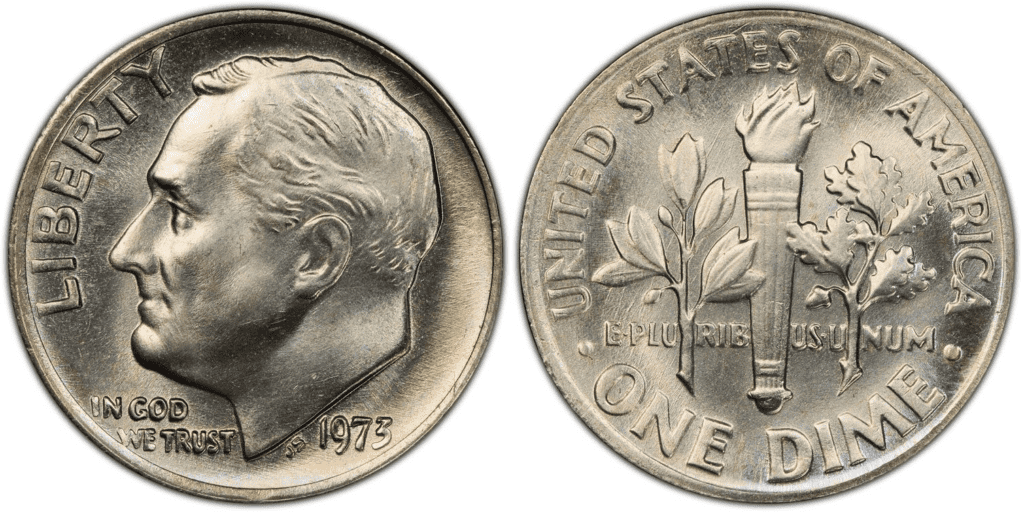
The Philadelphia Mint produced more than 315 million dimes in 1973. This is lower than what was produced in the previous and following year. Aside from that, the pricing of circulated 1973-P dimes may range from $0.15 to $0.35.
1973 Proof Roosevelt Dime
Year of minting: 1973
Mint Mark: S
Place of minting: San Francisco
Quantity produced: 2,760,339
Face Value: $0.10 (ten cents)
Price: $7 or more (uncirculated condition)
Mass: 2.27 grams
Edge: Reeded
Designer: John R. Sinnock
Composition: 75% copper, 25% nickel
Diameter: 17.90 millimeters
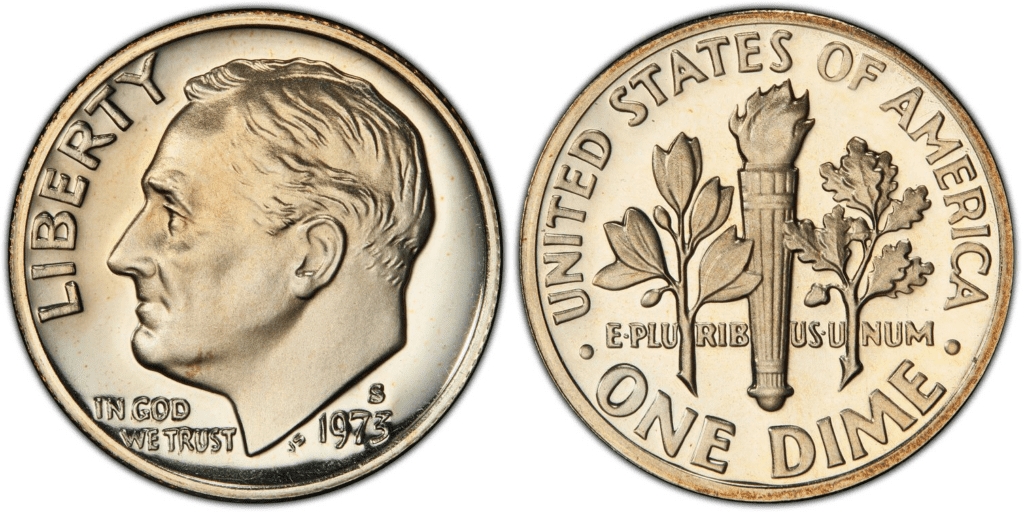
There was a great demand for proof coins in 1973. This is evidenced in the mintage figure of the 1973 proof dimes issued by the San Francisco mint center. More than 2.7 million dimes were coming from the SF mint at that time.
Proof coins are special types that are more beautiful and detailed than regular coins. At times, proof coins are struck twice to reveal the engraved materials’ details. Proof coins can be more time-consuming to produce, but it is more expensive than their dime counterparts.
List Of 1973 Roosevelt Dime Errors
With more than 770 million 1970 dimes produced, it is not difficult to imagine how some coins might come out of the mint centers with some errors in them. It’s common knowledge among coin collectors that an error coin can be more valuable than regular coins.
With this in mind, you might be interested in knowing more about error coins. In this case, take a look at some of the 1973 Roosevelt dime errors below:
Struck-through error
Sometimes, a foreign object gets stuck either on the die or the planchet. This foreign object can be anything, from dust to metal clippings. Depending on the foreign object’s size, type, and location, the manifestation of a struck-through error can vary.
Here’s an example of a struck-through error due to grease:
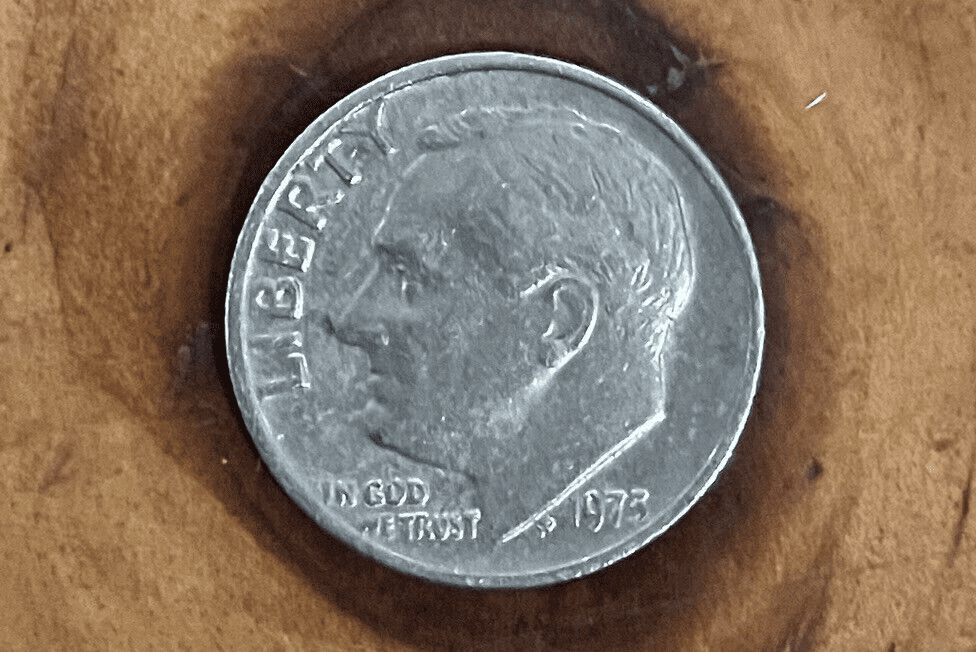
Because of grease, the die didn’t fully strike the coin. So, the image looks mushy and soft.
Doubled die error
The doubled die error is another common error in US coins. The die hits the planchet twice instead of just once. Normally, two strikes won’t cause any errors. However, when the second strike is struck to a different angle of the coin, then the coin would look doubled.
The more prominent or noticeable the doubling effect on the coin, the higher its value.
Annealing error
Annealing error happens when some of the metal molecules of the coin migrate towards the surface, causing uneven distribution of the metal. This can cause discoloration on the coin.
Here’s an example of a 1973 dime with an annealing error:
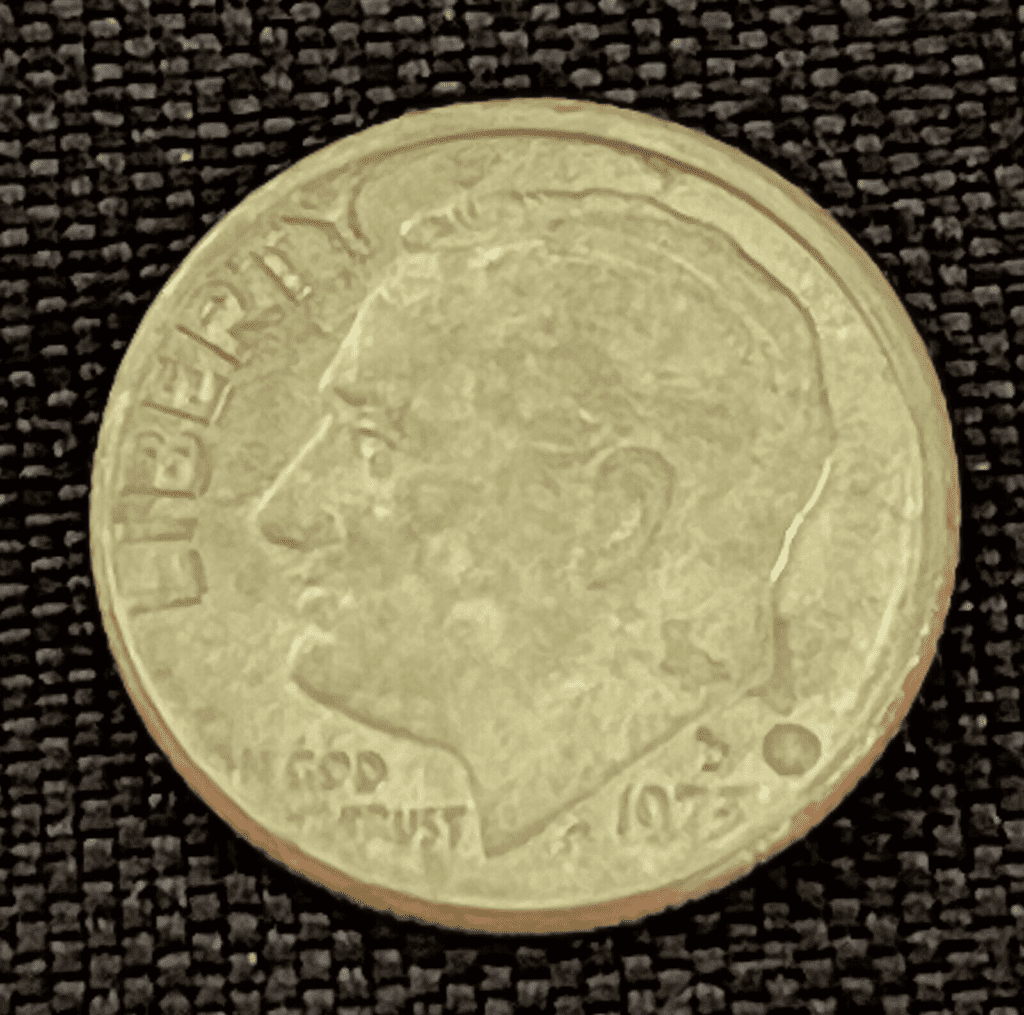
How Much Is 1973 Roosevelt Dime Worth Today?
The 1973 dime can either be cheap or expensive. The face value of the dime is 10 cents. It has no precious metal in it. So, you can trade it at its face value. The melt value isn’t too big, which is just around $0.0240.
So, yes, the 1973 Roosevelt dime can be very affordable. Nevertheless, you might ask, how can a 10-cent coin be worth more than its face value? The answer lies in its condition and rarity. That’s why you’ll find some 1973 Roosevelt dimes that are more valuable.
Here’s a table to show you the auction records for each 1973 dime variety:
| Coin | Condition | Grade | Sold date | Sold by | Value |
| 1973 Proof Roosevelt Dime | Perfect Uncirculated | PR 70 – Deep Cameo | January 8, 2014 | Heritage Auctions | $7,050 |
| 1973 P Roosevelt Dime | Uncirculated | MS 62 | September 7, 2017 | Heritage Auctions | $1,020 |
| 1973 D Roosevelt Dime | Superb Gem Uncirculated | MS 67 (Full Band) | September 22, 2020 | eBay | $400 |
How Does The Grading System Work?
Grading is primarily done for coins to determine their condition and value based on a standard. To grade a 1973 dime, an appraiser would need to look at the appearance, level of preservation, quality of strike, and color of a coin.
The appraiser would need to use the Sheldon Scale to grade a coin. It’s a 70-point grading scale, which gives the 1976 dime its score. 1 is the lowest score, while 70 is the highest.
Aside from the 70-point system, adjectives are assigned to a coin to know its condition quickly. For example, a coin with a grade of 4 to 6 is called Good. A coin with a grade of 20 to 35 is called Very Fine.
Specifically for dimes, there’s also a special designation called the Full Band. When the horizontal band of the Liberty Torch is detailed, the coin would be assigned with a Full Band designation. Having this designation could potentially increase the value of the coin.
Where To Buy Or Sell 1973 Roosevelt Dime?
You can buy a 1973 dime online or offline. The most popular online places are eBay, Amazon, USA Coin Book, Grey Sheet, and other websites. These online platforms can help you both buy and sell 1973 dimes.
Offline, you have coin shops, pawnshops, and antique stores. Auction houses are also a great place to find rare 1973 dimes.
FAQs
How much is a 1973 error dime worth?
The value of the 1973 error dime would depend on the type of its error, how rare it is, and its level of preservation. Error coins may not be that valuable if they look ordinary. However, if it is rare and still in good condition, it can be sold for several hundred or thousand dollars.
Is a 1973 dime silver?
No, the 1973 dime is not made of silver. Instead, it is made of copper and silver.
Is a 1973 dime no mint mark worth anything?
The value of the 1973 dime with no mint mark depends on its condition and rarity. The more preserved and rare the dime is, the higher the value is. To give you an example, a 1970 Proof Roosevelt Dime with a PR 70 grade was sold for $7,050 on January 8, 2014, by Heritage Auctions.
